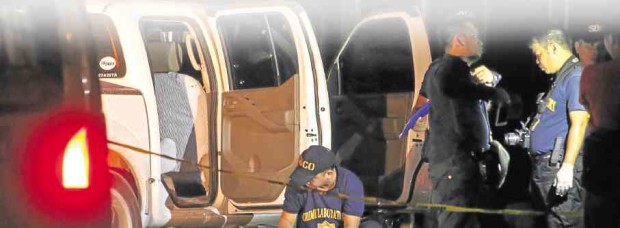Amid drug deaths, nonlethal options offered

THE WAR on drugs continues to claim fatalities, keeping forensics teams busy checking for clues in scenes of summary executions or clashes, like this street in Cebu City where a suspected pusher was killed in a gunfight with police. LITO TECSON/CEBU DAILY NEWS
A Sports tournament in Bulacan. Financial assistance in Bukidnon.
Nonlethal ways to fight the drug menace, by reforming users and pushers, are taking shape nationwide as the death toll in President Duterte’s war on drugs continued to mount.
In the city of Malolos, Bulacan province, confessed users and pushers had been invited to take part in a month-long sports tournament, sponsored by the city government, as part of their rehabilitation program.
In Bukidnon province, users and pushers who show readiness to reform get not only a new lease in life, but cash assistance, too, courtesy of the provincial government.
The Malolos tournament started on Monday at the city sports complex. According to Mayor Christian Natividad, it would help remove the stigma associated with drug addiction and involvement.
Article continues after this advertisementCity officials called the tournament “Tokhang Inter-Barangay Unity Games” which drew an initial 400 participants among 2,600 drug dependents who had surrendered to police.
Article continues after this advertisementShunned
“Many of those who surrendered have been shunned because they have been identified in the communities as addicts and pushers,” said Natividad. “They are avoided in the streets,” he added.
The mayor said some of the confessed users and traffickers lost their jobs after they were targeted by the police. He said he would help these people land jobs again.
The tournament, said Natividad, offers no cash prizes but “gives participants a chance to exercise, have fun and show the public that they are ready to become part of society.”
The Bukidnon provincial government, according to provincial information officer Hansel Echavez, has released for cash assistance to users and pushers at least P800,000 out of the P5-million antidrug fund of Gov. Jose Maria Zubiri.
At least 35 pushers had received P25,000 to help them find new sources of livelihood, Echavez said.
Before the users and pushers get aid, however, they should first be screened by the National Bureau of Investigation office in Northern Mindanao, which would also conduct background checks on the aid recipients.
Safer in NBI
Zubiri, who accompanied most of the confessed pushers to the NBI regional office, said it was safer for the suspects to go to the NBI than the police. He did not elaborate.
The governor said it was up to the beneficiaries what source of livelihood they want to invest in, as long as they put the money to good use.
A group of pushers from the town of Talakag, for instance, spent the money on fish production, which the aid recipients are familiar with.
Echavez said the provincial government is offering technical help to other aid recipients who want to use their money on other enterprises.
Many of those who surrendered said they were driven by poverty or lack of options to the drug trade.
One of them is Mac, a 50-year-old resident of Talakag, who went into farming after arriving from Saudi Arabia where he worked for 27 years.
Mac said his misfortune started when he suffered crop losses as a result of El Niño. His hardship worsened when his wife, a nurse, suffered a stroke.
Left with nothing
His plight turned for the worse after his savings was drained, forcing him to sell his house and farm.
When he failed at farming, Mac said he sold drugs after he was convinced by a cousin in Marawi City.
But the sale of drugs was not profitable because of competition. He also started using “shabu” (methamphetamine hydrochloride) himself.
“Over time my drug consumption increased,” said Mac. “I had to sell my car and my other house just to pay off debts from my drug supplier,” he said.
With virtually nothing left to him, Mac eventually lost what mattered most—his wife and children who left him. Carmela Reyes-Estrope, Inquirer Central Luzon and Jigger Jerusalem, Inquirer Mindanao